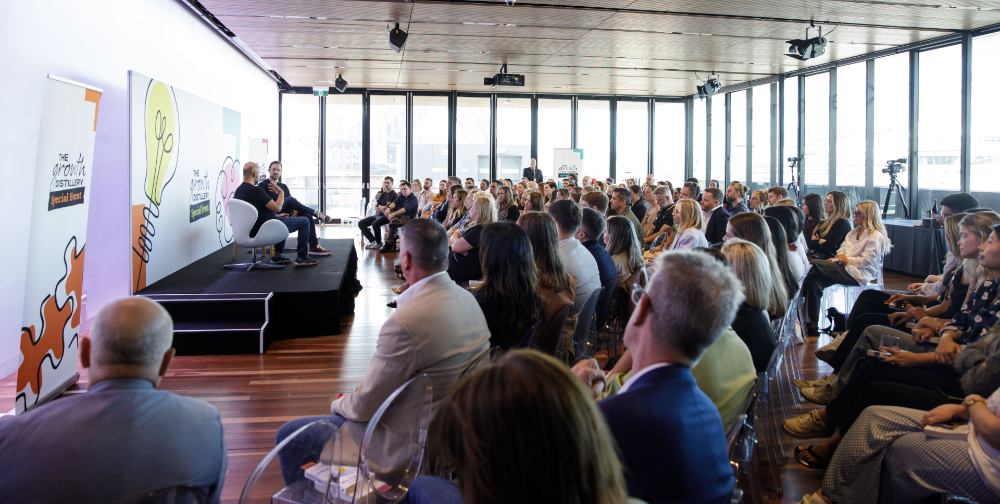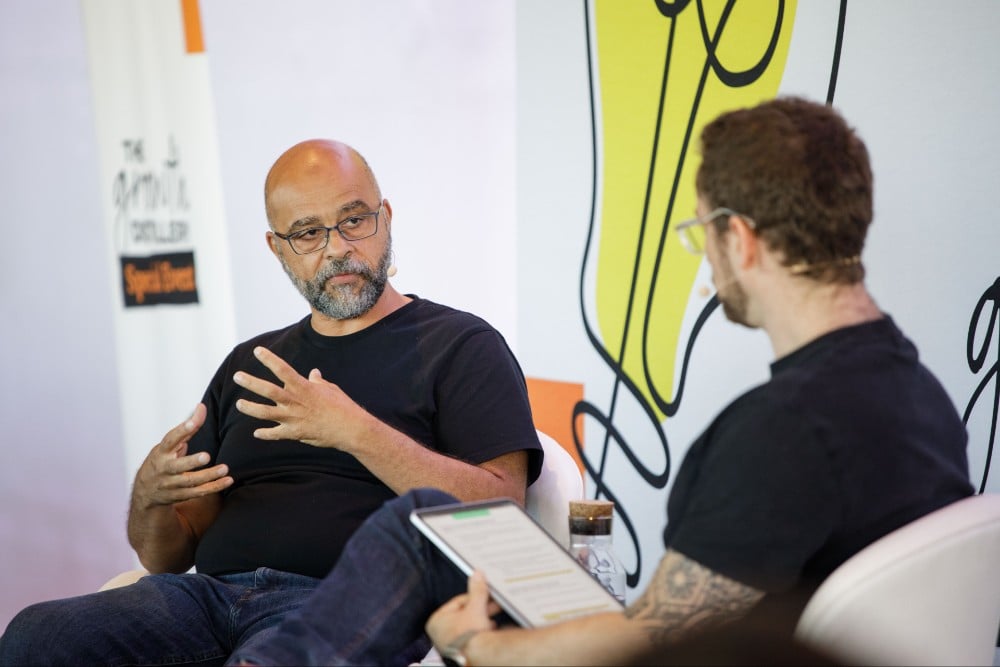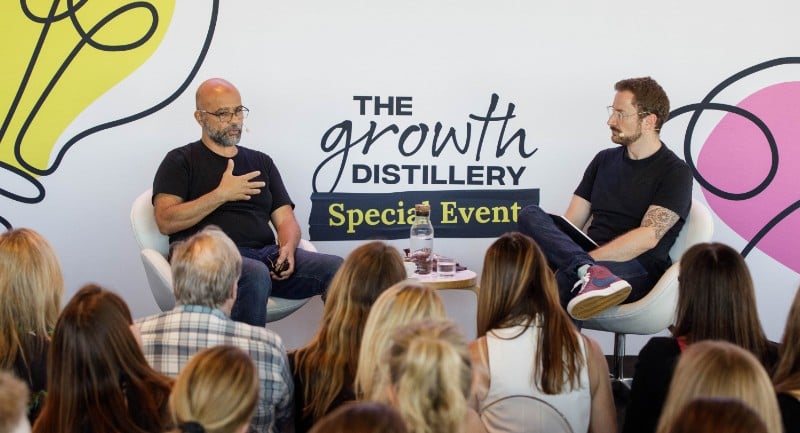Away from the hustle and bustle of the SXSW conference yesterday, the team from The Growth Distillery held an adjacent event with SXSW keynote speaker Mo Gawdat.
Gawdat is a keynote speaker at SXSW and yesterday morning spoke to a full conference hall. He is a former Chief Business Officer at Google X and host of the mental health podcast Slo Mo. The SXSW talk was so popular that an overflow room with a video feed of the talk and seating for a couple of hundred people also neared capacity.
Later in the afternoon, The Growth Distillery hosted him for an intimate (by SXSW standards) chat with Director of The Growth Distillery, Dan Krigstein. The two spoke on stage, not about AI which was the focus of his talk earlier in the day, but instead on Gawdat’s mission to help people embrace mental health and find a centred approach to life.
Mediaweek spoke with Krigstein after the session to better understand the value of hosting a session like this as an adjunct to SXSW and what Krigstein and his team got out of it personally.

Mediaweek: What is The Growth Distillery wanting to get out of a session like the talk with Mo Gawdat?
Dan Krigstein: The purpose of yesterday’s session is really, I guess, a show of gratitude for our clients, our partners, the community of practise that has made The Growth Distillery the success that it is. We always try to bring in a talent that feeds growth in a way that might be sort of adjacent or unusual area that executives and our partner organisations might be overlooking, which from yesterday’s topics of conversation was really this idea of self-care and optimising for our own wellbeing.
What I’m hoping that our guests take from yesterday is just a toolkit to help better navigate the world around them, to become better parents, better leaders, to cultivate a life that is more nourishing within a backdrop that is looking a little scarier with each and every day.
What led you to Mo specifically? Because as a top-level idea, he’s former Google X, he’s very sort of interested in AI, which is heavily what yesterday’s keynote at SXSW was about. But he also has his book that he’s written talking about dealing with stress. What was the process of recognising him and then realising where you could go with the session?
So, there’s a bit of a backstory here. So I’ve been a fan of Mo’s for a couple of years now, but the trigger was really last year’s special event when we had Steven Bartlett. One of the guests questions that we had at the end was, of all of the people that Steven had interviewed, what was the one episode that he recommends more often than not and the one that had the most profound impact on him as a conversation? And the guy just looks at the audience and goes: “Oh, easy. Number one and number two are the same guy.”
And he directs us to episode, I think it was 101 of one of the follow-up episodes that Mo had been on. So it was Steven directed us to Mo, and ironically, the episode that he directed us to was one that Mo had done with Steven on happiness.
That led us, me and a couple of the team, down sort of this rabbit warren of Mo Gawdat’s books. And then when we were talking with SXSW about bringing him out, it was actually pretty good because I knew that we wanted to talk about the stuff that he’s often not speaking about, but the stuff that really he’s passionate about. And SXSW wanted to go down the road of what is the guy’s perspective on AI.
It worked out really well because we wanted to make sure that guests that were also going to SXSW had an opportunity to see both sides of the guy and both territories where he is, you know, truly a domain authority.
AI is obviously the topic du jour of the moment. In thinking about your average media professional, people’s interest in AI are twofold.
People are trying to work out where they fit in the greater scheme of it. While you were trying to settle on your theme of who you want to talk to, was there part of you thinking that, oh, we actually really do need to address AI, or was it more just you wanted a reprieve?
I think people are going to get their fill of what I would call AI insight over the next week at SXSW.
In fact, I think we’re going to get to a point where people are really trying to process and consolidate all of the very many perspectives. And that’s really what they are. They’re just informed perspectives, even from those that are truly at the forefront of this.
I think it’s going to be hard to separate truth from perspective or, you know, truth from future-casting in a world that is changing so rapidly. And that wasn’t really why we wanted to bring Mo to town.
What we wanted to bring Mo to town for was, fundamentally in a world that is becoming faster paced, becoming louder where it’s becoming materially more difficult to predict the future.
And anyone that hazards a guess, or at least claims, that they can predict what is going to play out in what timeframe is probably selling you snake oil. You know, in my opinion, certainly, but, in Mo’s opinion as well.
One of the things that we were talking about was what’s the skill sets that you need to thrive no matter what comes. Emotional resilience and mental agility tend to be the two that I land on.
It wasn’t so much a reprieve per se, because what we spoke about was certainly intended to be constructive and in terms of building out a toolkit to navigate.
But, in a SXSW conference that is brimming with AI, we wanted to provide something that I think was more practical and useful, no matter what the background was. And me providing yet another perspective on the, as you said, topic du jour, just adds potentially to the noise and adds to the stress rather than helps those that are part of our community.

A comment Mo made during the talk caught the attention of some attendees when he said that he takes six weeks out every year to practice solitude.
For you personally, how much are you in a position to take six weeks off for a month of solitude and wellness?
Look, personally speaking, I’m very, very lucky that I am, I’m privileged to lead a very competent team led by an exceptionally brilliant set of leaders.
I would have absolutely no issue taking six weeks off. The issue that I have is that I have a young family. It’s not really about me anymore.
It’s about the young children that I’ve brought into the world and making sure that they are being set up to thrive. But, I think I’m probably not the every-person when it comes to that. I’ve got a very, very unique position of privilege with a team that I could be out of the building for six weeks and my team would thrive. I’m very confident in that regard.
It’s a defence mechanism when you come out of these things and you’re confronted with some stimulus that might suggest that some of our life choices are keeping us on this hedonic treadmill, right? And it’s a defence mechanism to come out and go: “it’s easy for him to say because he can go and take that time off.”
But, you could argue that the table stakes are also higher for a guy that is building his own businesses that has a racked and stacked agenda as he does. So I really hope that people take the essence of what he’s saying around prioritising our wellbeing, being able to build a suspension system to help us navigate the world around us, putting on our own oxygen masks right before the kids – you’re on a plane and they go: “Well, don’t put on your kids first. You have to put on your own oxygen mask.”

